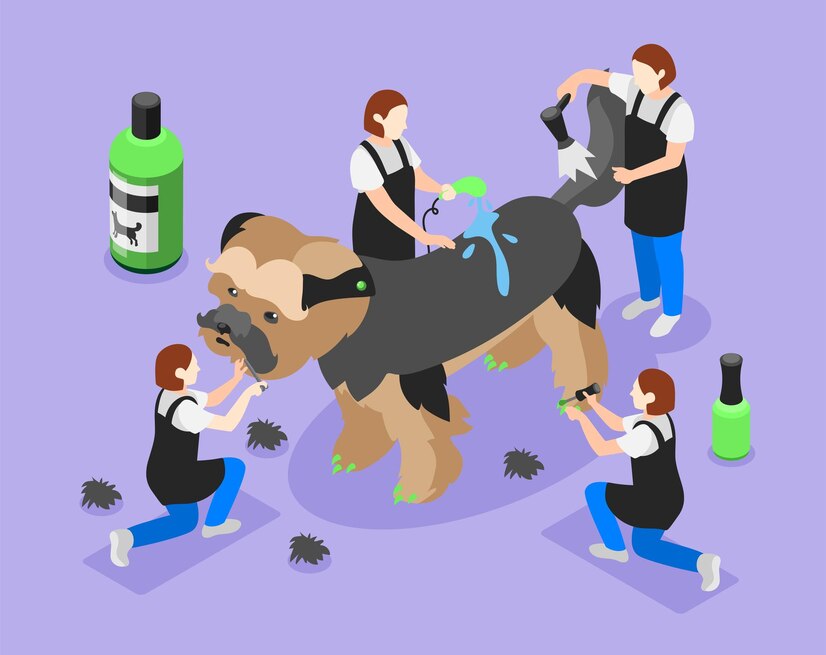In 2025, the dog grooming industry in the UK is booming, and the demand for skilled professionals is higher than ever. Whether you’re entering the field or seeking to enhance your career, it’s crucial to possess the right mix of technical expertise and soft skills. Here’s a guide to the top 10 Skills and qualifications for dog groomers you’ll need to succeed in the competitive grooming market.
Top 10 Skills for Dog Groomers Needed in 2025
- Animal Handling Skills
- Technical Grooming Skills
- Knowledge of Dog Breeds
- Communication Skills
- Patience
- Customer Service Skills
- Health and Safety Knowledge
- Certifications in Dog Grooming
- Time Management
- Physical Stamina
1. Animal Handling Skills
- Stay calm and patient: Dogs may react unpredictably, especially when they are nervous or anxious. Maintain a calm demeanor to soothe the pet.
- Learn body language: Understand how to read dogs’ body language to detect fear, aggression, or comfort.
- Start with smaller breeds: Gain experience handling smaller breeds before moving on to larger or more challenging dogs.
- Handle with care: Always use gentle touch when working with nervous or aggressive dogs to avoid injury to both you and the dog.
2. Technical Grooming Skills
- Master grooming tools: Familiarize yourself with different tools like clippers, scissors, and grooming tables to ensure you use them safely and effectively.
- Learn breed-specific cuts: Research different grooming styles for various dog breeds to enhance your skill set and offer specialized services.
- Practice regularly: Groom friends’ or family members’ dogs to refine your cutting techniques and speed.
- Stay updated: Attend workshops or courses to learn the latest trends and techniques in dog grooming.
3. Knowledge of Dog Breeds
- Understand grooming needs for different coats: Learn how to care for dogs with different coat types, from short-haired to long-haired or curly-coated breeds.
- Know the grooming standards for each breed: Some breeds have specific grooming styles, such as the Poodle or Shih Tzu, which require specialized cuts.
- Stay updated: New dog breeds may come up, so always stay updated on their grooming needs.
- Study breed grooming guides: Use reliable sources like grooming textbooks or online resources to get a deeper understanding of each breed’s specific requirements.
4. Communication Skills
- Listen actively: Pay close attention to what your clients want and communicate your thoughts clearly so there is no confusion about their expectations.
- Ask the right questions: Before starting, inquire about any special grooming needs, allergies, or medical conditions that the dog may have.
- Explain the process: Educate clients about the grooming process, expected results, and aftercare tips.
- Provide feedback: After grooming, give your clients suggestions on how they can maintain their dog’s coat and overall health.
5. Patience
- Work at the dog’s pace: Some dogs may take time to get used to the grooming process. Be patient, and give them breaks if needed.
- Develop calming techniques: Use calming words and a steady voice to make nervous dogs feel safe.
- Don’t rush: Ensure you’re not cutting corners. Taking your time results in better work and ensures the dog’s safety.
- Practice on different dogs: The more you handle various dogs, the more confident and patient you’ll become with your grooming approach.
6. Customer Service Skills
- Be approachable: Always greet clients with a friendly, professional demeanor.
- Ask for feedback: After each grooming session, ask clients for feedback to improve your service.
- Be transparent: Let clients know about any issues or conditions you notice with their pet’s coat, nails, or skin.
- Follow up: Contact clients after a few days to check if their dog is adjusting well and if they’re satisfied with the grooming.
7. Health and Safety Knowledge
- Know common pet health issues: Learn to recognize signs of common skin issues, ear infections, or parasites that may require veterinary attention.
- Maintain hygiene: Always sanitize your grooming tools and equipment between sessions to avoid the spread of infections.
- Follow safety guidelines: Learn and follow health and safety protocols, including the safe handling of tools and chemicals.
- Educate clients on pet health: Provide useful tips on regular care like nail trimming and coat maintenance to help owners keep their dogs healthy.
8. Certifications in Dog Grooming
- Enroll in recognized courses: Take courses like City & Guilds or other accredited certifications to enhance your skill set and career opportunities.
- Stay current: Renew certifications or attend continuing education classes to stay updated on new trends in grooming.
- Build a portfolio: Showcase your certifications and completed training on your website or social media to build trust with clients.
- Seek specializations: Consider getting certified in specialized areas like hand-stripping or creative grooming for added career growth.
9. Time Management
- Set clear schedules: Plan your day in advance and allow adequate time for each dog, taking into account their size and coat condition.
- Prioritize tasks: Start with the most difficult dogs or the ones that require more time, leaving easier tasks for later.
- Use scheduling tools: Utilize scheduling apps to keep track of appointments and manage your workload effectively.
- Limit distractions: Focus on the task at hand and avoid distractions to stay efficient and ensure quality service.
10. Physical Stamina
- Stay hydrated: Make sure to drink plenty of water throughout your workday to stay energized and focused.
- Stay active: Grooming requires long hours of standing and bending. Keeping yourself physically fit can help you handle the physical demands of the job.
- Take breaks: Schedule short breaks to prevent burnout and maintain focus.
- Use ergonomic tools: Invest in tools designed to reduce physical strain, such as grooming tables that adjust height and comfortable scissor grips.
RECOMMENDED READ;
- How Much Do Dog Groomers Make in the UK in 2025? Salary Insights
- How to Make Extra Money as a Dog Groomer in the UK for 2025: A Complete Guide
- How to Find Clients as a Dog Groomer in the UK in 2025: A Complete Guide
High-Quality Qualifications and Certifications Needed by Dog Groomers
As mentioned, certifications are not mandatory but they do make a difference in your career. Some of the most recognized qualifications in the UK include:
- City & Guilds Level 2 Certificate in Dog Grooming
- City & Guilds Level 3 Certificate in Dog Grooming
- International Professional Groomers (IPG) Certification
These certifications not only enhance your skills but also boost your credibility and allow you to charge higher rates.
Key Locations for Dog Groomers in the UK
- London: A hotspot for luxury grooming services, including spa treatments and creative grooming.
- Manchester: A growing demand for professional grooming services in suburban areas.
- Birmingham: Mobile dog groomers thrive due to the mix of suburban families and city professionals.
- Edinburgh: Known for boutique grooming services, offering personalized care.
- Leeds: A pet-friendly community where demand for skilled groomers is rising.
How to Get Started as a Dog Groomer
If you’re just starting, the best way to enter the dog grooming industry is through formal training. Dog grooming schools and courses can teach you the technical aspects of the trade, and hands-on internships or apprenticeships allow you to practice your skills in real-world environments.
Why These Skills Matter in 2025
In 2025, dog grooming is no longer just about cutting fur—it’s about offering high-quality, personalized services that cater to the growing demands of pet owners. Specializing in certain skills, such as creative grooming or breed-specific cuts, can help set you apart in the competitive dog grooming market. Additionally, with the increasing trend toward mobile grooming services, many groomers are expanding their businesses and offering flexibility to clients.
Ready to enhance your dog grooming career? Sign up on Hayanow today and connect with clients looking for professional grooming services across the UK!
FAQs About Dog Groomer Skills and Qualifications
What are the most important skills for a dog groomer in 2025?
The most important skills for dog groomers in 2025 include animal handling skills, technical grooming skills, knowledge of dog breeds, communication skills, patience, and health and safety knowledge. These are critical to providing high-quality grooming services and ensuring both the pet’s and the groomer’s safety.
Do I need certifications to become a successful dog groomer?
While certifications like City & Guilds are not mandatory, they are highly beneficial. They help you gain credibility, demonstrate your commitment to professional growth, and may enable you to charge higher rates for your services.
How can I improve my animal handling skills as a dog groomer?
Improving animal handling skills can be achieved through practice and learning. Begin by working with different breeds and temperaments, attending courses, and watching tutorials from experienced professionals. Stay calm and patient, and always approach dogs with care.
Is it necessary to specialize in certain dog breeds to become a successful dog groomer?
While it’s not necessary to specialize in specific breeds, having expertise in handling a variety of breeds can enhance your employability and reputation. However, specializing in certain breeds or grooming styles can help you attract premium clients and higher-paying opportunities.
What qualifications should I look for in a dog grooming certification?
Look for certifications that are widely recognized in the industry, such as City & Guilds Level 2 and Level 3 in Dog Grooming. These qualifications show your commitment to the profession and help you gain the necessary skills and knowledge to succeed.
How can I build my reputation as a dog groomer?
To build your reputation, offer exceptional service, ask clients for testimonials, and showcase before-and-after photos of your work on platforms like Instagram. Networking locally with pet stores, vets, and dog trainers can also lead to valuable referrals.



